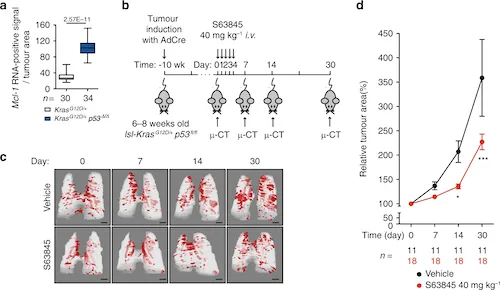Munkhbaatar, E., Dietzen, M., Agrawal, D., Anton, M., Jesinghaus, M., Boxberg, M., Pfarr, N., Bidola, P., Uhrig, S., Höckendorf, U., Meinhardt, A. L., Wahida, A., Heid, I., Braren, R., Mishra, R., Warth, A., Muley, T., Poh, P., Wang, X., Fröhling, S., … Pfeiffer, F., ... & Jost, P. J. MCL-1 gains occur with high frequency in lung adenocarcinoma and can be targeted therapeutically. Nature communications, 11(1), 4527 (2020) . https://doi.org/10.1038/s41467-020-18372-1
Purpose: Here we explore the role of pro-survival genes in cancer cell integrity during clonal evolution in non-small cell lung cancer (NSCLC). We identify gains of MCL-1 at high frequency in multiple independent NSCLC cohorts, occurring both clonally and subclonally. Clonal loss of functional TP53 is significantly associated with subclonal gains of MCL-1. In mice, tumour progression is delayed upon pharmacologic or genetic inhibition of MCL-1. These findings reveal that MCL-1 gains occur with high frequency in lung adenocarcinoma and can be targeted therapeutically.
Figure: Quantification of Mcl-1 mRNA in situ hybridisation in lesions from lsl-KrasG12D/+ and lsl-KrasG12D/+;p53fl/fl mice.
